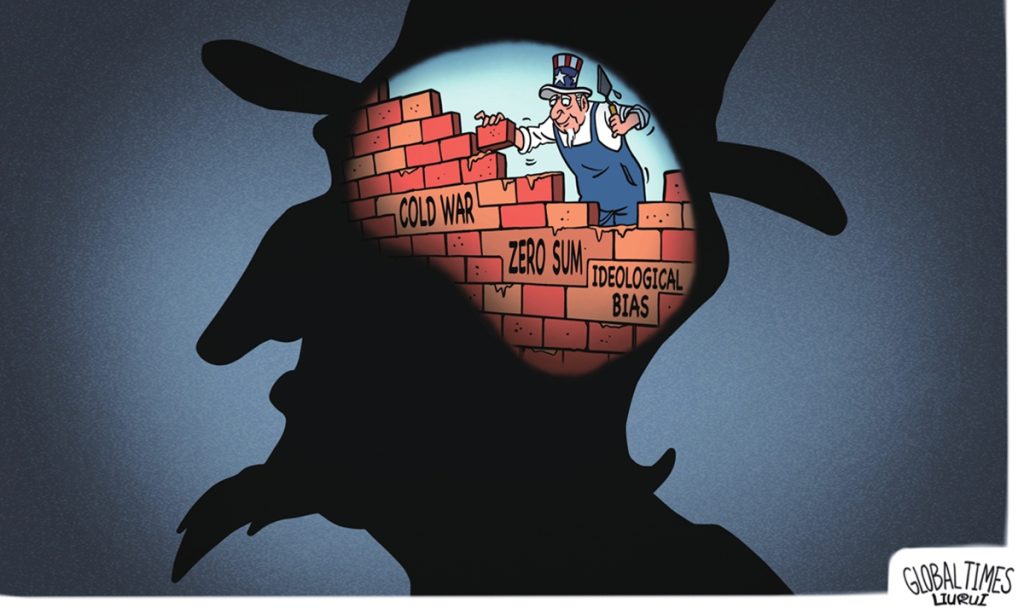‘New cold war’ with China, a trap concocted by US

Editor's Note:
The China-US bilateral relationship is one of the most important in the world. The trajectory of this relationship has attracted international attention. Still, the US is stepping up its efforts to suppress China on various fronts such as politics and diplomacy, economy, trade, technology, and military security, showing the true meaning of a cold war. The Global Times invites Chinese and foreign experts to expose the US' manipulation of the "new cold war" and reveal the damage it may potentially cause to the world.
This is the fourth installment of the series.
The "new cold war" between China and the US has become a hot topic of public opinion. Two representative articles are: "This is how we win a new cold war with China" published in March by Kevin Roberts, President of Heritage Trustee; the other is "A new cold war could be much worse than the one we remember" in June written by American strategist Charles A. Kupchan. Is a "new cold war" between China and the US really as "inevitable" as the two authors believe?
The Cold War was an all-out confrontation without a "hot war" between the US and the Soviet Union from the 1940s to the 1990s. Looking back at history, the Cold War that the US "won" was not a military victory. The Cold War was not a political victory for the US either, as the rise of China shattered the illusion and the "Washington model" failed to rein in supremacy.
Since the Biden administration came to power, it has spared no effort to gang up politically to revitalize the alliance of shared values against China, to "de-Sinicization" in the name of "de-risk" economically, and to build up an "Indo-Pacific circle" to suppress China militarily. Obviously, this "all-round" strategy is formulated under the guidance of a Cold War mentality, and its purpose is to bring China into its preset cold war strategic framework. This is also the fundamental reason why Western media is clamoring for a "new cold war" between China and the US.
However, as was the case in the Cold War between the US and the Soviet Union, the US will find it difficult to overwhelm China politically and militarily today. Recently, US Secretary of State Antony Blinken publicly stated that the US has to find a way to "coexist peacefully" with China amid intense competition.
China is not what it used to be. Due to China's reform and opening-up and the tide of economic globalization, the Chinese economy has been deeply integrated with the world economy. In this pattern, the US and its allies are entangled in two completely different games in the "competition" with China. The US regards China as the "biggest threat," thus promoting a "zero-sum" confrontation. However, due to the (temporary) irreversible economic interdependence, it's hard to "decouple" from China and the US' powerful internal vested interest groups are also firmly resisting "decoupling" from China. Rather, they have to "maintain fair economic exchanges" (so that they can continue to make money), which is essentially a "positive-sum" game of win-win compromise.
In other words, the misalignment of security and economic interests is the biggest obstacle for the US to consolidate its power internally and gang up on China externally, and this obstacle makes it difficult for the US to coalesce its political, military and economic power to contain China as it did against the Soviet Union.
More crucially, China will never be dragged into the strategic trap of a "new cold war."
In terms of ideology, China avoids a clear-cut confrontation with the US. The US puts forward what it calls "universal values" - essentially imposed "liberal democratic" values, while China focuses on the common good and promotes the building of a global community of shared future, insisting on taking its own path without exporting its ideology or forcing other countries to accept its own path.
On an economic front, China continues to open up and promote cooperative development for win-win results. As long as China adheres to reform and opening-up, the US' attempt to "de-Sinicize" its economy is a false proposition.
It can be seen that the most basic characteristics of the Cold War - ideological and political tit-for-tat, military confrontation, and complete economic "decoupling" - are not seen between China and the US. The claimed inevitable "new cold war" between China and the US is concocted by the US. According to the design of the US, China and the US will enter a state of the so-called new cold war, and then the US will be able to bring its political, military and economic forces and those of its allies together to suppress China.
It is obvious that China has not, and will not, follow the steps of the US and fall into its pre-determined cold war strategy. Instead, China will hold onto peaceful development and opening-up, and keep seeking cooperation without confrontation. In this way, one hand cannot clap to wage the "new cold war" without the other.


